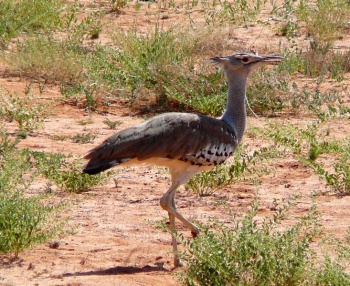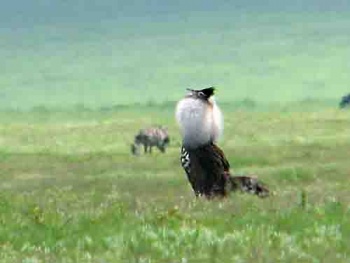m (Photo date) |
(Clearer male image. C/right. Imp sizes. Basic tidy-up. References updated.) |
||
| Line 1: | Line 1: | ||
| − | [[Image: | + | [[Image:TZP KoriBustard MAN4701.jpg|thumb|550px|right|Subspecies struthiunculus<br />Photo © by {{user|mikemik|mikemik}}<br />Manyara, [[Tanzania]], May 2018]] |
;[[:Category:Ardeotis|Ardeotis]] kori | ;[[:Category:Ardeotis|Ardeotis]] kori | ||
==Identification== | ==Identification== | ||
| − | + | [[Image:P1000441 .jpg|thumb|350px|right|Female<br />Photo © by {{user|ririhugs|ririhugs}}<br />Kdalagadi National Park, [[South Africa]]]] | |
| + | Male 120 cm (47¼ in); female 90 cm (35½ in) | ||
*Grey plumage | *Grey plumage | ||
| + | *Black wings | ||
| + | *White wing panel with black spots | ||
*Black crest | *Black crest | ||
*Yellow legs | *Yellow legs | ||
==Distribution== | ==Distribution== | ||
| − | |||
Disjunctly distributed in north-eastern and southern [[Africa]]. | Disjunctly distributed in north-eastern and southern [[Africa]]. | ||
==Taxonomy== | ==Taxonomy== | ||
| − | ====Subspecies<sup>[[#References|1]]</sup> | + | ====Subspecies==== |
| + | [[Image:39129KBustardD.jpg|thumb|350px|right|Displaying male<br />Photo © by {{user|DoriM|DoriM}}<br />Ngorongoro, [[Tanzania]], April 2006]] | ||
| + | There are 2 subspecies<sup>[[#References|1]]</sup>: | ||
*''A. k. struthiunculus'': | *''A. k. struthiunculus'': | ||
:*[[Ethiopia]] to north-western [[Somalia]], south-eastern [[Sudan]], north-eastern [[Uganda]] and northern [[Tanzania]] | :*[[Ethiopia]] to north-western [[Somalia]], south-eastern [[Sudan]], north-eastern [[Uganda]] and northern [[Tanzania]] | ||
| Line 18: | Line 22: | ||
Arid grasslands. | Arid grasslands. | ||
==Behaviour== | ==Behaviour== | ||
| − | + | ====Diet==== | |
| + | They have a very varied diet, consisting of snails, insects, seeds, berries, bulbs and acacia gum. | ||
====Breeding==== | ====Breeding==== | ||
The ground nest is built by the female who also incubates the eggs. She may not eat for several days. When the chicks hatch, the mother brings soft food. | The ground nest is built by the female who also incubates the eggs. She may not eat for several days. When the chicks hatch, the mother brings soft food. | ||
==References== | ==References== | ||
| − | #{{Ref- | + | #{{Ref-Clements6thAug18}}#Handbook of the Birds of the World Alive (retrieved October 2018) |
| + | #The Website of Everything | ||
{{ref}} | {{ref}} | ||
==External Links== | ==External Links== | ||
Revision as of 21:22, 21 October 2018
- Ardeotis kori
Identification
Male 120 cm (47¼ in); female 90 cm (35½ in)
- Grey plumage
- Black wings
- White wing panel with black spots
- Black crest
- Yellow legs
Distribution
Disjunctly distributed in north-eastern and southern Africa.
Taxonomy
Subspecies
There are 2 subspecies1:
- A. k. struthiunculus:
- A. k. kori:
- Southern Angola to Namibia, Botswana, southern Zimbabwe and Mozambique
Habitat
Arid grasslands.
Behaviour
Diet
They have a very varied diet, consisting of snails, insects, seeds, berries, bulbs and acacia gum.
Breeding
The ground nest is built by the female who also incubates the eggs. She may not eat for several days. When the chicks hatch, the mother brings soft food.
References
- Clements, J. F., T. S. Schulenberg, M. J. Iliff, D. Roberson, T. A. Fredericks, B. L. Sullivan, and C. L. Wood. 2018. The eBird/Clements checklist of birds of the world: v2018. Downloaded from http://www.birds.cornell.edu/clementschecklist/download/
- Handbook of the Birds of the World Alive (retrieved October 2018)
- The Website of Everything
Recommended Citation
- BirdForum Opus contributors. (2024) Kori Bustard. In: BirdForum, the forum for wild birds and birding. Retrieved 28 April 2024 from https://www.birdforum.net/opus/Kori_Bustard
External Links






